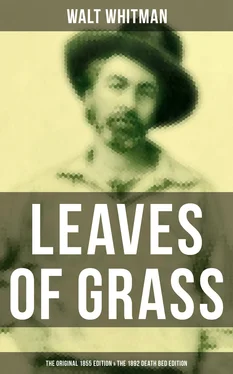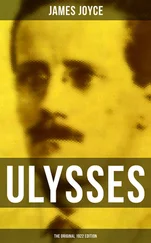Walt Whitman
(The Original 1855 Edition & The 1892 Death Bed Edition)
Published by
 Books
Books
Advanced Digital Solutions & High-Quality eBook Formatting
musaicumbooks@okpublishing.info2017 OK Publishing ISBN 978-80-272-3394-6
LEAVES OF GRASS, 1855
LEAVES OF GRASS, 1892
Although this poetry collection was first published in 1855, when Whitman was 36 years old, the poet spent his whole life revising the poems in several editions. Leaves and Grass is noteworthy for its depiction of sensual experience, which at the time of publication was considered immoral by many critics. Influenced by Ralph Waldo Emerson and the Transcendentalist movement, Whitman’s poetry praised nature and the individual human’s role within it. The title is a pun, with ‘Grass’ being a term given by publishers to works of minor value and ‘leaves’ being another name for the pages on which they were printed.
The first edition was published in Brooklyn at the Fulton Street printing shop of two Scottish immigrants, James and Andrew Rome, whom Whitman had known since the early1840s. Whitman financed and completed the typesetting for the first edition himself. The collection did not bear the poet’s name, instead offering an engraving by Samuel Hollyer depicting the poet in work clothes and a jaunty hat, with arms at his side. The book itself was very small, collecting only twelve unnamed poems in 95 pages. Whitman had once said he intended the book to be small enough to be carried in a pocket, which, would “induce people to take me along with them and read me in the open air: I am nearly always successful with the reader in the open air.” About 800 books were printed, though only 200 were bound in its trademark green cloth cover.
By the time the last edition was completed at the end of Whitman’s life, Leaves of Grass had grown from a small book of 12 poems to a large tome of almost 400 works. As the volume changed, so did the pictures used by Whitman to illustrate them, with the last edition depicting him as an old man with a full beard and jacket, with a wise and distinguished persona.
To give our readers an insight into the poet’s development, the 1855 first edition is included in this eBook, followed by the Inclusive Edition, based on the last version revised by the poet.
Main TOC Table of Contents LEAVES OF GRASS, 1855 LEAVES OF GRASS, 1892
CONTENTS
Preface
Song of Myself (1855)
A Song for Occupations (1855)
To Think of Time (1855)
The Sleepers (1855)
I Sing the Body Electric (1855)
Faces (1855)
Song of the Answerer (1855)
Europe the 72d and 73d Years of These States (1855)
A Boston Ballad (1855)
There Was a Child Went Forth (1855)
Who Learns My Lesson Complete (1855)
Great Are the Myths (1855)
Table of Contents
America does not repel the past or what it has produced under its forms or amid other politics or the idea of castes or the old religions... accepts the lesson with calmness... is not so impatient as has been supposed that the slough still sticks to opinions and manners and literature while the life which served its requirements has passed into the new life of the new forms... perceives that the corpse is slowly borne from the eating and sleeping rooms of the house... perceives that it waits a little while in the door... that it was fittest for its days... that its action has descended to the stalwart and wellshaped heir who approaches... and that he shall be fittest for his days.
The Americans of all nations at any time upon the earth have probably the fullest poetical nature. The United States themselves are essentially the greatest poem. In the history of the earth hitherto the largest and most stirring appear tame and orderly to their ampler largeness and stir. Here at last is something in the doings of man that corresponds with the broadcast doings of the day and night. Here is not merely a nation but a teeming nation of nations. Here is action untied from strings necessarily blind to particulars and details magnificently moving in vast masses. Here is the hospitality which forever indicates heroes.... Here are the roughs and beards and space and ruggedness and nonchalance that the soul loves. Here the performance disdaining the trivial unapproached in the tremendous audacity of its crowds and groupings and the push of its perspective spreads with crampless and flowing breadth and showers its prolific and splendid extravagance. One sees it must indeed own the riches of the summer and winter, and need never be bankrupt while corn grows from the ground or the orchards drop apples or the bays contain fish or men beget children upon women.
Other states indicate themselves in their deputies... but the genius of the United States is not best or most in its executives or legislatures, nor in its ambassadors or authors or colleges or churches or parlors, nor even in its newspapers or inventors... but always most in the common people. Their manners speech dress friendships — the freshness and candor of their physiognomy — the picturesque looseness of their carriage... their deathless attachment to freedom — their aversion to anything indecorous or soft or mean — the practical acknowledgment of the citizens of one state by the citizens of all other states — the fierceness of their roused resentment — their curiosity and welcome of novelty — their self-esteem and wonderful sympathy — their susceptibility to a slight — the air they have of persons who never knew how it felt to stand in the presence of superiors — the fluency of their speech — their delight in music, the sure symptom of manly tenderness and native elegance of soul... their good temper and open-handedness — the terrible significance of their elections — the President’s taking off his hat to them not they to him — these too are unrhymed poetry. It awaits the gigantic and generous treatment worthy of it.
The largeness of nature or the nation were monstrous without a corresponding largeness and generosity of the spirit of the citizen. Not nature nor swarming states nor streets and steamships nor prosperous business nor farms nor capital nor learning may suffice for the ideal of man... nor suffice the poet. No reminiscences may suffice either. A live nation can always cut a deep mark and can have the best authority the cheapest... namely from its own soul. This is the sum of the profitable uses of individuals or states and of present action and grandeur and of the subjects of poets. — As if it were necessary to trot back generation after generation to the eastern records! As if the beauty and sacredness of the demonstrable must fall behind that of the mythical! As if men do not make their mark out of any times! As if the opening of the western continent by discovery and what has transpired since in North and South America were less than the small theatre of the antique or the aimless sleepwalking of the middle ages! The pride of the United States leaves the wealth and finesse of the cities and all returns of commerce and agriculture and all the magnitude of geography or shows of exterior victory to enjoy the breed of fullsized men or one fullsized man unconquerable and simple.
Читать дальше

 Books
Books










